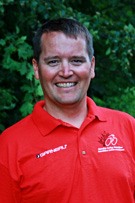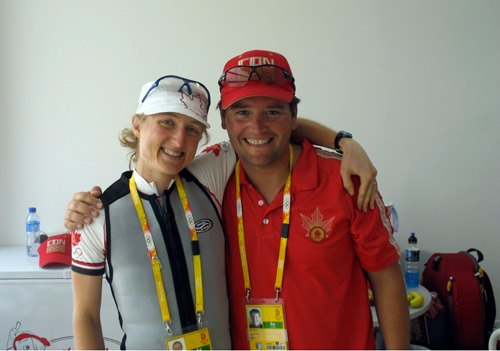 Dan Proulx is the Head Coach of Canada's National Mountain Bike Team and the personal coach of the 2011 UCI Mountain Bike World Champion, Catharine Pendrel. He will be the Head Coach for the Mountain Bike team at the 2012 Olympic Games in London. He has been coaching for over 20 years and is a Level 4 NCCP coach with a Diploma in High Performance Coaching from the National Coaching Institute in Calgary.
Dan Proulx is the Head Coach of Canada's National Mountain Bike Team and the personal coach of the 2011 UCI Mountain Bike World Champion, Catharine Pendrel. He will be the Head Coach for the Mountain Bike team at the 2012 Olympic Games in London. He has been coaching for over 20 years and is a Level 4 NCCP coach with a Diploma in High Performance Coaching from the National Coaching Institute in Calgary.
During his career, he has coached national team athletes in track, road, and mountain bike and athletes under his guidance have won more than 15 national titles.
Dan was the cycling team manager for all disciplines at the 2008 Olympic Games in Beijing and also coached two athletes on the team.
He currently lives in Victoria, British Columbia.
-
When did you first start coaching? Why?
I began coaching when I was 16 and got more serious about it in University. I had an incredible coach (Jeff Coulter) when I was a swimmer at Cascade Swim Club in Calgary. He had confidence in me and my potential to become a coach. He offered me my first real coaching job. It seemed like a natural progression into the coaching profession. I’ve been coaching ever since.
-
What are the three things you like MOST about being a national team coach?
1) Challenging athletes and other coaches to see what is possible.
2) Building excellence in every aspect of the National Team program.
3) Building a High Performance culture...a team that truly believes we will win.
-
How did the NCCP prepare you for your role as a national team coach?
The NCCP program, and in particular the NCI in Calgary, has been integral to my success. The courses I completed became springboards into higher levels of learning. I can still think of key items from each and every course I’ve taken that have become strongly ingrained in my coaching practice. If you have an open mind and are serious about excellence, there are always lessons to be learned. I think the NCCP program is a fundamental foundation for every successful coach. You start with a base of information and then you innovate and evolve from there.
At the NCI in Calgary I had a pretty incredible group of peers and instructors. Almost all of the coaches from that graduating class have gone on to coach Olympic medallists and World Champions. We had great instructors like Mary-Ann Reeves, Steve Norris (planning & physiology), Kimberley Amirault (sport psychology), Dave Ellis (energy systems), Joan Vickers (decision training), Penny Werthner (leadership) and Jon Kolb (growth and development). It was a great experience.
My coaching career has given me some incredible experiences in a few different sports -- from swimming and triathlon and eventually into cycling. Along the way, I’ve had the opportunity to work alongside some of the best coaches in the world - particularly during my time at the Olympic Oval in Calgary. I think that was a real advantage because it gave me a unique perspective on coaching and athlete preparation. Each sport has taught me something that has made me a better coach today. I feel like coaches can learn a lot by being open-minded and being willing to look at how other sports approach problems -- instead of being stuck in the mindset of your own discipline. I always feel like there is a lot more to learn. It’s been an exciting process.
-
What do you think makes you an effective coach?
You have to be a good leader with a style that matches your coaching philosophy. Ideally you’re an active learner and a true student of the sport. An effective coach is approachable and an excellent communicator. You have to be organized and always one step ahead of the game. You have to be a good planner who has a good vision of the future. An effective coach is a person who really understands people. You have to know how to get the best performance out of each team member. You have to be good at anticipating and proactively planning for change in sport.
-
What will be your greatest coaching challenge leading in to the London 2010 Olympic Games?
The biggest challenge is going to be keeping it simple. As Kristina Groves says, “the Olympics are about doing something you’ve done 1000’s of times...one more time.” My job is to keep things steady and consistent going into the Games. We’ve been relentless in practising the ingredients and preparation needed for the Games. We’ve already done dress rehearsals for most elements involved on-site in London. The Games are simply about executing the plan we have rehearsed and innovating to meet the challenges thrown in our path. One of my roles is to keep athletes and staff calm...focused on the work. We have a job to do and it’s time to execute what we’ve already perfected.
-
Describe your most embarrassing moment as a coach:
That was probably at the last Olympics when I made an error on our driving route for the Manager’s Meeting. I had to drive like it was a James Bond car chase through the streets of Beijing. It was pretty crazy. In the end we were only about five minutes late -- luckily we were able to overcome this using some good diplomacy we’d built up with the officials. The Olympics are definitely never easy. Luckily you have the best problem solvers in the World all in one place.
-
What has been your greatest coaching moment/achievement to date?
One of those moments was definitely seeing Catharine Pendrel win the World Championships last summer. It was a pretty inspiring moment. I can remember back in 2003 when Catharine’s goal was to win a BC Cup. It’s incredible how far she’s come. For me, the reward is still mostly about seeing people improve their personal level of performance. It’s about challenging them to achieve something they might not think is possible. Even though it was a World Championship win, it was still just about reaching further and achieving a higher level than before. It was only a day or two before we began talking about aiming even higher....trying to make those time gaps even bigger for 2012. The pursuit of excellence is endless.
-
What is your favourite quote?
“Not everything that can be counted counts, and not everything that counts can be counted.”- Albert Einstein.
Coaching is both an art and a science. We’re definitely in an era where athletes and coaches often think that there is a measurable unit for everything. Many rely on instrumentation and formulas, instead of instinct and expertise, to prescribe every element of training and performance. In my career I’ve learned so much and experimented with so many different approaches. In the end I’ve learned to concentrate on what really matters -- so the process has become simpler rather than more complex. A good coach knows what counts.
We asked Catharine Pendrel some fun questions about Dan – here’s what she had to add:

-
What is the thing your coach says to you that you hate the most/but know it will help you?
“Kika, it’s time to do some low cadence strength work”.
-
Name one song that reminds you of your coach, and why?
Steppenwolf’s “Born to be wild”….not for the chorus, but the rest of the lyrics. It feels like Dan, embracing an adventure and heading out on the road, enjoying the feeling of embracing something new.
-
If he had to evacuate his house immediately, what is the one thing he would grab on the way out?
iPad and coffee…. which are two things, yet always found connected; therefore I claim they are one.
-
What is your coach’s most unusual habit?
He gets up at 4-5 every morning (very unusual) just to drive routes we’ll ride later in the day -- or bike 10kg of water into random spots in the desert so we can fill up mid-ride and keep going.